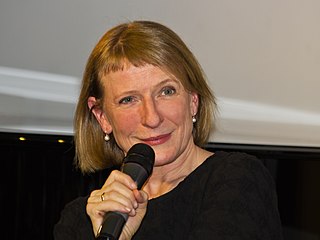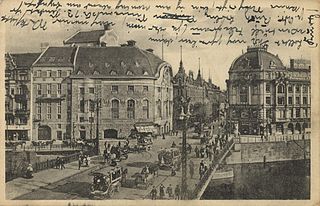
The Staatsoper Unter den Linden, also known as the Berlin State Opera, is a listed building on Unter den Linden boulevard in the historic center of Berlin, Germany. The opera house was built by order of Prussian king Frederick the Great from 1741 to 1743 according to plans by Georg Wenzeslaus von Knobelsdorff in the Palladian style. Damaged during the Allied bombing in World War II, the former Royal Prussian Opera House was rebuilt from 1951 to 1955 as part of the Forum Fridericianum square. Nicknamed Lindenoper in Berlin, it is "the world´s oldest state opera" and "the first theater anywhere to be, by itself, a prominent, freestanding monumental building in a city."

The Deutsche Oper Berlin is a German opera company located in the Charlottenburg district of Berlin. The resident building is the country's second largest opera house and also home to the Berlin State Ballet.

Siegfried Matthus was a German composer, conductor, and festival founder and manager. Some of his operas, such as Judith, were premiered at the Komische Oper Berlin in East Berlin. In 1991, he founded the chamber opera festival Kammeroper Schloss Rheinsberg and directed it until 2018. In 2005, he composed a Te Deum for the reopening of the Dresden Frauenkirche. Matthus is considered one of Germany's most often performed contemporary composers.
Harry Alfred Robert Kupfer was a German opera director and academic. A long-time director at the Komische Oper Berlin, he worked at major opera houses and at festivals internationally. Trained by Walter Felsenstein, he worked in the tradition of realistic directing. At the Bayreuth Festival, he staged Wagner's Der fliegende Holländer in 1978 and Der Ring des Nibelungen in 1988. At the Salzburg Festival, he directed the premiere of Penderecki's Die schwarze Maske in 1986 and Der Rosenkavalier by Richard Strauss in 2014.
Barrie Kosky is an Australian theatre and opera director. Based at the Komische Oper Berlin, he has worked internationally.

The Internationale Maifestspiele Wiesbaden is a theater festival in Wiesbaden, Germany. Established in the late 19th century after the Bayreuth Festival, the festival is one of the most distinguished international theatre and music festivals in the world. It is presented annually in May at the Hessisches Staatstheater Wiesbaden, the State Theatre of Hesse in the capital Wiesbaden. The festival currently features performances of operas, ballets, plays and musicals. Visiting companies, mostly from European theaters, present their recent productions along with performances of the Theater Wiesbaden. Concerts from a wide array of music genres are featured as well as artistic circus acts and modern dance presentations. Lectures, recitals, cabaret performances, art showings and readings are also part of the program.

Opernwelt is a monthly German magazine for opera, operetta and ballet. It includes news about current performances, portraits of composers and performers, articles about opera houses, performance spaces, and contemporary and historical subjects from the world of opera and classical music. It reviews recordings and books and publishes monthly schedules of German and international opera houses. The magazine's website offers full text search for past issues. A year book is published every October.

Dagmar Manzel is a German actress. She has appeared in more than 80 films and television shows since 1979. She starred in the 1986 film So Many Dreams, which was entered into the 37th Berlin International Film Festival.
Berlin Opera may refer to:

The Theater des Westens is one of the most famous theatres for musicals and operettas in Berlin, Germany, located at Kantstraße 10–12 in Charlottenburg. It was founded in 1895 for plays. The present house was opened in 1896 and dedicated to opera and operetta. Enrico Caruso made his debut in Berlin here, and the Ballets Russes appeared with Anna Pavlova. In the 1930s it was run as the Volkstheater Berlin. After World War II it served as the temporary opera house of Berlin, the Städtische Oper. In 1961 it became the first theatre in Germany to show musicals. Since then it has become the "German equivalent of Broadway extravaganzas", putting on plays and musical comedies.
Kurt Horres was a German stage director, particularly of opera, and opera manager. He held positions as general manager at the Staatstheater Darmstadt, the Hamburg State Opera, and from 1986 to 1996 at the Deutsche Oper am Rhein. He focused on opera of the 20th century, including composers who had been banned during the Nazi regime, such as Korngold's Die tote Stadt, and literature operas including Gottfried von Einem's Kabale und Liebe, and the world premieres of Blacher's Yvonne, Prinzessin von Burgund, and Klebe's Das Mädchen aus Domrémy. He taught stage direction at the Folkwang University.
Martin Erhard Fischer was a German music and theater director.
Andreas Bauer Kanabas is a German classical bass in opera and concert. Prior to December 2018, he performed under the name Andreas Bauer. A member of the Oper Frankfurt, he has performed major roles at German and international opera houses. Besides Mozart's Sarastro, and kings in operas by Verdi and Wagner such as Philip II of Spain and Marke, he has portrayed characters such as Bluebeard, Tiresias, and Ibn-Hakia.
Heinz Rückert was a German opera director. He was one of the co-founders of the Halle Georg Friedrich Handel Renaissance.
Stephan Stompor was a German musicologist and dramaturg.
Katrin Lea Tag is a German scenic and costume designer for drama and opera, whose works have appeared internationally. In 2020, she was named Scenic Designer of the Year by Opernwelt, for productions such as Barrie Kosky's Salome for the Oper Frankfurt.
Uta Priew is a German operatic mezzo-soprano.

Ute Trekel-Burckhardt is a German operatic mezzo-soprano. She was a long-time lead soloist of the Staatsoper Unter den Linden in East Berlin. She took part in world premieres such as Noch einen Löffel Gift, Liebling? by Siegfried Matthus and Heinrich Sutermeister's Le Roi Bérenger. Even before the fall of the Berlin Wall, she appeared internationally, including the Vienna State Opera in her signature role, the tile role of Der Rosenkavalier, and at Opéra de Nancy in Schönberg's Erwartung.

The old Komische Oper was a privately run Opera house in Berlin-Mitte, Friedrichstraße 104, at the Weidendammer Bridge. It is not to be confused with today's Komische Oper Berlin, Behrenstraße 55-57. The naming Komische Oper referred to the Parisian Opéra-Comique.
Joachim Herz was a German Opera director and manager. He learned at the Komische Oper Berlin as an assistant to Walter Felsenstein. His major stations were the Leipzig Opera where he opened the new house with Wagner's Die Meistersinger von Nürnberg, Komische Oper and Semperoper in Dresden, where he opened the restored house with Weber's Der Freischütz in 1985. He staged many world premieres, and worked internationally. Herz was the first director to apply Felsenstein's concepts to Wagner's Der Ring des Nibelungen, staged in Leipzig from 1973 to 1976.











